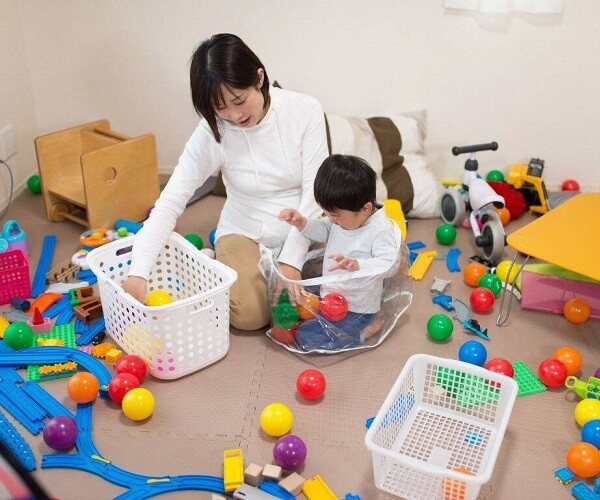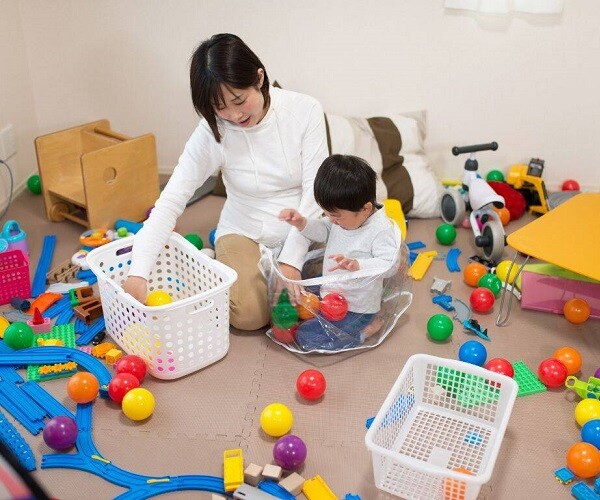Harvard University conducted a study and found that children experience four critical brain development stages as they grow. Parents who understand and apply appropriate educational methods will foster a brighter future for their children.
So, what are these four critical stages of brain development, and what should parents do?


Sensory Formation Stage Before 6 Months Old
Infants under six months old follow a “feed and sleep” cycle, so care during this stage focuses on ensuring they are well-fed and healthy.
However, the true rhythm of brain development occurs during these first six months. Synaptic connections in the brain undergo a “formation explosion,” with 700-1000 synapses forming per second. Therefore, proper stimulation during this stage lays a robust cognitive foundation.

Image source: Pinterest.
Parents can use various tools to help stimulate their baby’s senses before they turn six months old.
For example, use different textures like velvet, cotton, or beaded massage balls to massage their hands and feet, activating their tactile nerves.
Visual stimulation can be achieved through black and white striped cards and cards with colorful geometric patterns for visual tracking games. As the baby gets older, introduce high-contrast patterns to further develop their observation skills.

The first six months are crucial for sensory formation.

Golden Stage of Language Development: Ages 1 to 3
Children typically complete the process of speech and language organization between the ages of one and three. However, many children struggle with language expression due to a lack of specialized training during this golden stage.
Before children start speaking, their brains undergo a crucial construction process, much like building a house. It takes time to lay a solid foundation before moving on to the next stages.
Unfortunately, many parents miss this logic and assume that children will naturally learn to speak as they grow.
In reality, a child’s language expression ability is strongly linked to their vocabulary acquisition before turning three. If a child falls behind during this stage, it significantly impacts their language expression, comprehension, and communication skills.
Of course, without language stimulation, brain development may lag.

Children usually complete the process of speech and language organization between ages one and three.
So, how can parents lay the foundation during this stage?
It is undeniable that daily vocabulary building is the key to teaching children to speak.
Parents can treat their children as conversation partners. There is no need to worry about whether the child understands. Instead, use simple language to talk about various everyday topics, such as eating and playing.
For example, say, “Today, we’re having fried eggs and tomatoes for lunch.”
“It’s a beautiful sunny day! Do you want to go out and play?”
Initially, you may only get babbling responses, but language acquisition is not an immediate process. It requires long-term patience and persistence.
Engage in more conversations and interactions in daily life to accumulate language input and pave the way for a language explosion.

Cognitive Development Stage: Ages 3 to 6
Age three is a turning point in a child’s development. After turning three, children’s thinking gradually shifts from concrete to abstract. They understand that the number 5 can represent five apples or five toys.
– Children start to grasp that the symbol ‘+’ means addition or more.
– They can even understand simple logical relationships like “because… so…”
The brain at this stage is like a computer that has been upgraded and can handle complex tasks more smoothly.
Parents can use picture books, games, and other tools to build logical bridges for their children, helping their thinking evolve to a higher level.

Ages three to six are crucial for cognitive development.
For instance, show your child a picture in a book of a bear caught in the rain without an umbrella, and ask them what they should do. Then, guide them to observe and deduce possible outcomes.
Parents can also turn everyday life into learning opportunities. Before going shopping at the supermarket, make a shopping list together and ask, “What should we prepare before we go out? Where can we find the soy sauce and other condiments mom needs to buy?”
This way, their logical reasoning and organizational skills can be honed step by step.

Rule-Building Stage Before Elementary School: Age 6
Some parents complain that their children cannot sit still or pay attention in class.
In such cases, it is likely that the child is forming a sense of rules in a skewed direction for the first time.
For children aged 6-7, just before entering elementary school, the “frontal lobe” of the brain enters a rapid development stage. This brain region is responsible for judgment, planning, reasoning, and emotional control.
If parents want their children to understand and follow rules in the future, they must instill a sense of rules from the beginning.
What should parents do specifically?
When establishing rules, avoid preaching grand principles. Instead, start with small things in everyday life and help children understand what these rules mean.
For example, explain that they should wash their hands before eating and after coming home from outside.

Some essential rules to teach children before age six.
Establish rules for daily life and follow them consistently. Of course, children at this stage seem to have hundreds of thousands of questions running through their minds.
Take the simple issue of handwashing. Some children may ask, “Why do we need to wash our hands?”
Parents should not dismiss these questions or think that the child is arguing. On the contrary, this is the development of their basic logical thinking.
When faced with such inquiries, patiently explain that our environment contains many bacteria, and handwashing is the process of removing them.
Of course, parents may encounter challenging questions beyond their knowledge. In such cases, use online resources to find and verify answers together with your child, stimulating their brain development.
Rather than focusing on high or low scores, it is essential to develop good study habits during this stage. Scientific guidance and parental support are vital nutrients for children’s brain development.
If parents can grasp these four stages and provide a supportive environment, their children’s IQ will flourish. Of course, if any of these golden stages are missed, it is never too late to start. Parental understanding and guidance are the most precious gifts for a child’s development.





































